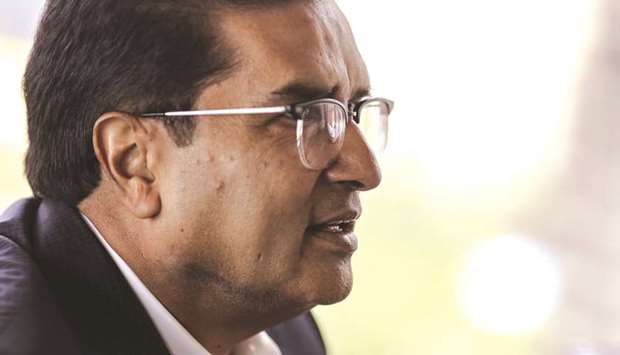For India to thrive, it needs something more concrete than the optimism driving its equity market to record heights.
That’s the view of Raamdeo Agrawal, the stock picker who helped build Motilal Oswal Financial Services into a multi-billion dollar company. From the firm’s high-rise in a fast-growing business district in central Mumbai, he has seen the benchmark index set fresh records most every other day.
“This is price to hope,” he says. “Hope is hope. It is not real.”
Agrawal points to the congested roads below, and talks about the stalled plans for a much-needed second airport in Mumbai, India’s financial capital. The government says the project, first proposed in 1997 when Bill Clinton was US president, will be partly operational by 2020.
“We have a reasonable building,” Agrawal says of his office. “But you see the roads. I can’t go and build the roads. They have to be built by the government,” he says. “We need a very high-quality airport and there’s no dearth of land or money. It is about sheer execution.” Investors have been betting Prime Minister Narendra Modi will develop infrastructure and create jobs in the world’s largest democracy. The S&P BSE Sensex’s 17% advance so far this year means it’s valued at 23 times reported earnings, among the highest in Asia.
In this year’s federal budget, the government proposed a record Rs3.96tn ($61.5bn) to build and modernise railways, airports and roads. In March, junior road minister P Radhakrishnan told lawmakers that construction of highways was slowed by delays in acquiring land and environmental clearances, protests and poorly performing contractors.
If anyone can smash the logjams that keep India below Namibia and Azerbaijan in the World Economic Forum’s infrastructure ranking, it’s Modi, according to Agrawal.
He says the prime minister, who took office in May 2014, still has “massive” political capital, citing the goods and services tax due to start on July 1 as a reason for hope. A thumping win for Modi’s party in key state elections in March added to optimism.
“Now we have a very strict headmaster,” Agrawal said. “India has the chaos of 60 years of leaderlessness. You know what happens when a strict principal comes in at school? All the chaos is over.”
Agrawal, a longtime Warren Buffett fan, was fresh back from his annual pilgrimage to Omaha for Berkshire Hathaway’s shareholder meeting. Like Buffett, the 60-year-old advocates buying only a few stocks and holding them.
Agrawal began his career as a sub-broker on the Mumbai Stock Exchange in 1987, crowding inside a hall and shouting orders under the open outcry system. He worked with partner Motilal Oswal to build a $2.5bn company whose shares have returned an average of 19% annually since going public in 2007, twice as much as the Sensex. Motilal Oswal’s asset management arm, which focuses on value investing targeting small and mid-cap stocks, oversees about $3.6bn.
Agrawal and his family hold 36% of Motilal Oswal, according to the company. That’s worth about $900mn, data compiled by Bloomberg show.
Agrawal, who’s seen many boom and bust cycles over three decades investing in Indian equities, says the market will correct when people least expect it. Even Modi’s shock junking of 86% of the currency in November to fight graft only briefly halted the rally, he notes.
While Asia’s third-largest economy expanded 7.1% in the year ended March, making it an investor favourite, India can enjoy a decade of double-digit growth if Modi accelerates reforms, Agrawal says. Within that, the key to successful investing is to back ambitious first-generation entrepreneurs like himself, he says.
Motilal Oswal’s India Opportunity Portfolio Strategy Fund holds 15 to 20 companies from industries including financial services and building materials - sectors the money manager believes will show the fastest growth. The Rs24.6bn mutual fund for wealthy individuals has returned about 19% a year since it started in February 2010, beating the 15% annual gain in its benchmark.
Its biggest holding, Development Credit Bank, is a Mumbai-based lender whose shares have more than doubled since February last year. Kajaria Ceramics, another top pick, has seen its stock surge nine-fold in the past five years, guided by Ashok Kajaria, who founded the tile maker 28 years ago.
For all his optimism, Agrawal isn’t afraid to entertain his doubts. Despite considering Buffett a personal hero, he sold all his Berkshire shares last year after realising the company couldn’t meet his growth criteria.

Agrawal: Seeking to boost reforms.
